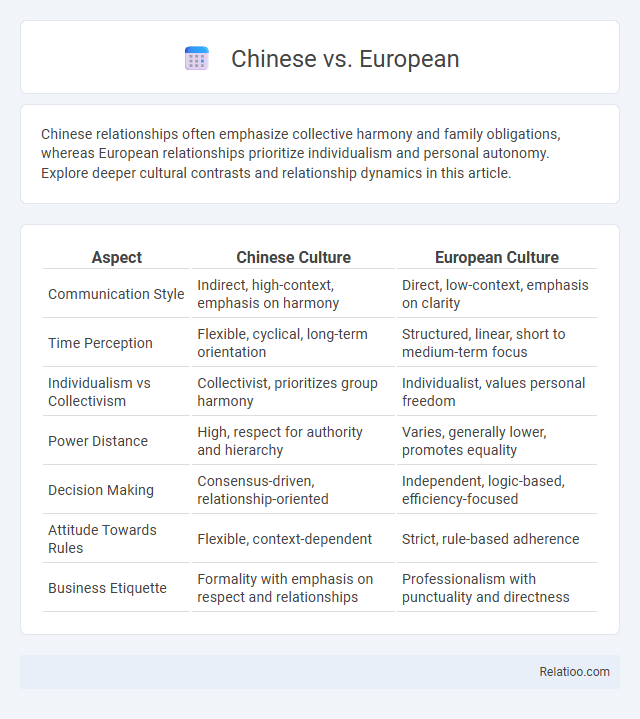Chinese relationships often emphasize collective harmony and family obligations, whereas European relationships prioritize individualism and personal autonomy. Explore deeper cultural contrasts and relationship dynamics in this article.
Table of Comparison
| Aspect | Chinese Culture | European Culture |
|---|---|---|
| Communication Style | Indirect, high-context, emphasis on harmony | Direct, low-context, emphasis on clarity |
| Time Perception | Flexible, cyclical, long-term orientation | Structured, linear, short to medium-term focus |
| Individualism vs Collectivism | Collectivist, prioritizes group harmony | Individualist, values personal freedom |
| Power Distance | High, respect for authority and hierarchy | Varies, generally lower, promotes equality |
| Decision Making | Consensus-driven, relationship-oriented | Independent, logic-based, efficiency-focused |
| Attitude Towards Rules | Flexible, context-dependent | Strict, rule-based adherence |
| Business Etiquette | Formality with emphasis on respect and relationships | Professionalism with punctuality and directness |
Historical Background: Chinese vs European Societies
Chinese societies historically emphasize filial piety rooted in Confucianism, where respecting elders is a fundamental moral duty reinforcing family hierarchy and social harmony. European societies traditionally prioritized individualism, with elder respect evolving through religious values and feudal loyalty, often focusing on status and authority within communal or noble structures. Your understanding of elder respect varies significantly due to these distinct historical and cultural foundations shaping social interactions in China and Europe.
Philosophy and Worldview: East Meets West
Chinese respect emphasizes Confucian philosophy, valuing hierarchical relationships, filial piety, and collective harmony, while European respect often stems from individualism, Enlightenment ideals, and egalitarianism highlighting personal autonomy. Elder respect in Chinese culture integrates spiritual reverence and ancestral worship, contrasting with European traditions that prioritize legal rights and social roles for elders. Your understanding deepens by exploring how Eastern holistic worldviews emphasize interconnectedness, whereas Western thought promotes analytical reasoning and individual dignity.
Governance and Political Systems: Contrasts and Comparisons
Chinese governance emphasizes hierarchical respect rooted in Confucian values, prioritizing centralized authority and social harmony, contrasting with European political systems that often value democratic participation and institutional checks and balances. Elder respect in China influences policy-making through filial piety and age-based hierarchy, whereas European systems incorporate elder wisdom within legal frameworks and representative institutions. Your understanding of these cultural nuances reveals how governance models shape societal respect differently across regions.
Economic Models: Chinese and European Approaches
Chinese economic models emphasize Confucian values of filial piety, integrating elder respect with multigenerational household support that bolsters family-based wealth and social stability. European approaches often separate elder care from economic participation, relying more on institutional frameworks and social welfare systems to support aging populations. Your understanding of these distinct models highlights how cultural values shape economic strategies in sustaining elder respect and financial security across societies.
Educational Systems: Differences and Similarities
Chinese educational systems emphasize hierarchical respect and filial piety, deeply rooted in Confucian values that prioritize obedience and deference to elders and teachers as authority figures. European educational approaches often encourage critical thinking and mutual respect, promoting dialogue between students and educators rather than strict hierarchical obedience. Elder respect in both systems reflects cultural norms, with China maintaining a more formalized and ritualized practice compared to Europe's more individualistic and informal expressions of reverence.
Cultural Values and Social Norms
Chinese culture places paramount importance on elder respect, deeply rooted in Confucian values emphasizing filial piety and family hierarchy. European societies generally promote elder respect through social welfare systems and individual autonomy, reflecting a balance between tradition and modernity. Social norms in these regions differ as Chinese elders often receive daily reverence and care within multigenerational households, whereas European elders prioritize independence and institutional support.
Art, Architecture, and Aesthetics
Chinese respect for elders is deeply rooted in Confucian values, evident in traditional architecture with ancestral halls and intricate wood carvings symbolizing reverence and continuity. European respect is often expressed through the preservation of historical art and grand structures like cathedrals and statues, reflecting cultural heritage and societal status. Elder respect in art and aesthetics varies, with Chinese designs emphasizing harmony and filial piety, while European works highlight legacy and individual achievement.
Technological Innovation: Past and Present
Chinese cultural values emphasize respect for elders, intertwining tradition with technological innovation by integrating ancient wisdom and modern advancements in AI and renewable energy. European societies prioritize intellectual contributions equally across generations, fostering innovation through collaborative research and cutting-edge developments in biotech and digital infrastructure. Your understanding of elder respect and technological progress highlights diverse approaches to blending heritage with future innovations.
Interactions in Globalization
Chinese culture emphasizes hierarchical respect rooted in Confucian values, influencing business interactions with formal greetings and deference to elders and authority figures worldwide. European respect often combines individualism with politeness, promoting open dialogue and mutual understanding in cross-cultural globalization settings. Your success in global interactions depends on adapting to these diverse respect norms to build trust and effective communication.
Future Trends and Cooperation
Chinese culture emphasizes filial piety and collective elder respect, deeply rooted in Confucian values that influence social policies and intergenerational support systems. European societies are increasingly integrating formal elder care frameworks and promoting active aging, leveraging technology and policy innovation to enhance elder well-being. Future trends point toward cross-cultural cooperation that combines China's traditional respect with Europe's systematic elder care, fostering international knowledge exchange and collaborative development of elder-friendly technologies and social programs.

Infographic: Chinese vs European
 relatioo.com
relatioo.com